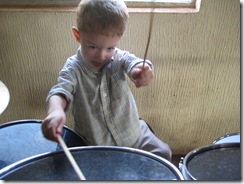
My poor mom. I was a real musical prodigy, as I sat on the bench, banged my hands on the keys, and cried my crocodile tears. “You’ll thank me someday,” she said. And, of course, I was doubtful.
My piano teacher didn’t have it much better, as I creeped and crawled through the lesson book, one excruciating week at a time. Two steps forward, three steps back. I think the summers I took off were as much for her sake, as my own.
So imagine the pressure when my beloved teacher from childhood days visited our church on a recent Sunday. You must understand . . . she was good. The kind of music director a pastor dreamed about, that could follow his leading without pause, no matter what antiquated song he pulled from the back of his brain on a whim. And there she sat as I led worship. I’m glad to report nothing too horrific happened. We had a good song service, and I didn’t knock the keyboard off its stand or forget the words to every song I ever knew.
I wonder what her thoughts were as I stood up there playing. Perhaps she marveled a bit to see her hard work finally pay off. Thanks to her efforts, my mother’s dogged persistence, and a handful of other patient instructors, I am now a music director in my own right. And it only took fifteen years.
Maybe some of you have your own little prodigies at home. Whether they be your own children, or someone else’s. I’m sure there are times you want a summer vacation as they bang through John Thompson or whatever course you’ve chosen.
Maybe my musical testimony can give you a hint of encouragement. They can make it. It might take a looooong time. But they can make it. And so can you!
P. S. Thanks, Mom!


